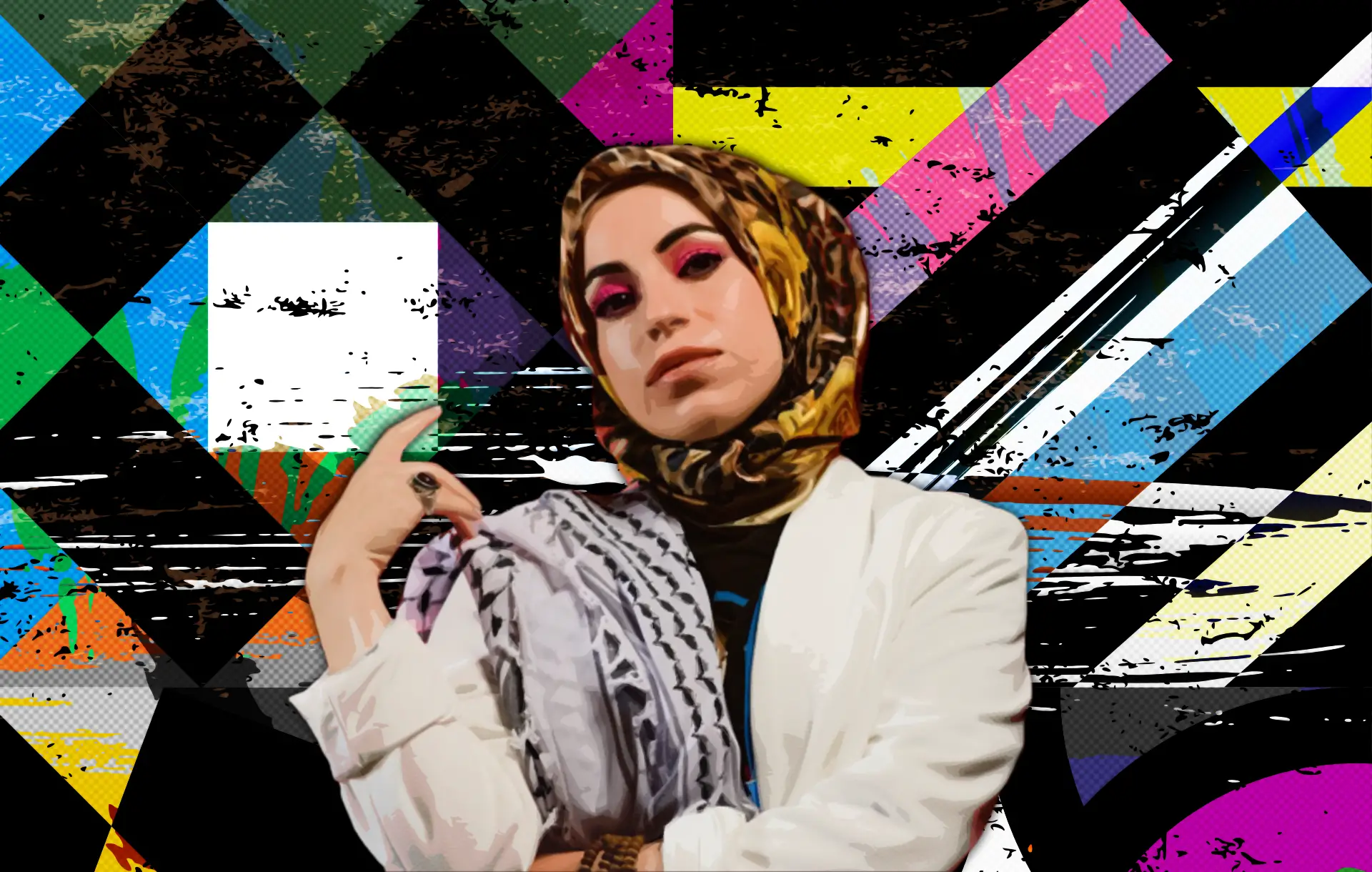It is a laborious task, but not impossible, to find the balance to exist in differing worlds. I recently spoke with hijabi rapper Mona Haydar, who understands this all too well.
Born in Saudi Arabia to Syrian parents, Haydar grew up amongst the African American community in Flint, Michigan, where she felt more loved and accepted as the daughter of immigrant Middle Eastern parents. Early on in her life, she realized that her heart resided in spoken word poetry and hip hop, and it was in the black community where her voice was loved and embraced. There she was taught to use her voice in a way that was beautiful and positive.
“That’s what hip-hop is about,” says Haydar. “It’s about telling the stories that are being told by the mainstream media. It’s about bringing people together, that systems like White Supremacy would have us be tearing each other apart, and instead, hip hop is about uniting.”
The Meaning of Hijab
While she is best known for her protest song “Hijabi (Wrap My Hijab)”, her views on Hijab do not reflect those portrayed on most Western mainstream media. To Haydar, Hijab is very multifaceted. In the physical sense, it is about a woman’s ownership of her own body, and in the spiritual sense, it is a practice.
“Hijab is a practice I use to open my third eye: My crown chakra. It’s a practice that I engage in order to elevate my consciousness,” she says.
Haydar goes on to criticize how the hijab can come to function as a weapon against women within the society by governments or families. According to her, the hijab can be problematic in patriarchy because it gets used to oppress women, but for her, it is all about autonomy and an act of liberation from the beauty industrial complex in the US. “It’s saying that NO, I don’t need to adhere to your beauty standards or values of what’s beautiful in the world. I get to decide that for myself.”
I asked her opinion about the online campaign My Stealthy Freedom initiated in 2014 by the Iranian journalist in exile Masih Alinejad against compulsory hijab in Iran. Haydar believes that global patriarchy is a weapon of mass destruction and oppression, especially against women. She condemns men’s historical entitlement to oblige women to dress according to patriarchal values in their societies and explains that there is usually a religion or philosophy behind this.
“In a place like Iran where women are not free to make the choice for themselves, like the Quaran, specifically says there is no compulsion in religion, you cannot tell a woman to wear the hijab or not. Islam tells you that you can not compel somebody to perform a religious duty or obligation. It is not the job of a government to do that.“
Haydar continues to acknowledge it as a privilege to be a Muslim woman in the US where such legal obligations do not exist. She tells me about her experience as a 15-year-old high school student in Saudi Arabia when she was forced to follow the strict dress code in public.
“It was one of the strangest times of my life. I was wearing the hijab, but in a place like Saudi Arabia where patriarchy is so rampant, I felt like my hijab was not mine.”
At that age, being young and exploring her own style, she was into punk and goth culture. She didn’t have a love for the hijab. In fact, the hijab disgusted her because it was something that she was told to do.
Embracing One’s Identities
Some years later, when she moved to Syria to study Arabic and Islamic spirituality, she found herself looking deep into her own heart and asking herself whether she was truly a Muslim. Living in Damascus among a diverse community of Muslims with women having the choice to wear the hijab or not, she felt a sense of liberation to practice her faith with no societal pressure to keep or lose it in order to fit in.
This was an eye-opening and liberating experience for her because she realized how vast and wide the net of Islam really was and how diverse the opinions within the Islamic perspective and worlds could be. It was through such profound self-reflection that she made a conscious choice to move forward into adulthood as a Muslim. She now embraces her American-Middle Eastern identities and resists being treated as “the other” in the US.
…she realized how vast and wide the net of Islam really was and how diverse the opinions within the Islamic perspective and worlds could be.
Many people look at a woman in a hijab and just expect her to be oppressed and uneducated. This perception does not limit itself to the western hemisphere, but Muslim communities as well. How to fathom the idea of a hijabi hip-hop artist?
On top of this, Haydar has a Master’s in Christian Ethics, is very vocal about the LGBTQ+ and Native American rights. She believes every individual is entitled to their own values and one’s choices should not be predetermined based on their looks or religion. Haydar refuses to accept western ideology dominating one’s understanding of life. She views the world as a combination of ideas and how systemic they are. For her, it is about coming to terms with who she is within all these systems.

Art for Art’s Sake?
Her approach to art is not one of art for art’s sake but one that serves a purpose. She aims to help her audience accept themselves for who they are wherever in the world they happen to be. She strives to make the world a more loving and open space for all of us to fit in.
“What tells people who you are is how you act in the world … That’s all I care about at the end. So, some people can say those things don’t go together, but when they see or hear my music, when they hear my message, when they hear my talks, I think it makes sense to people.”
This gives her music a universal appeal. A quick scan through the comments under her videos reflects the wide range of her fans worldwide. I asked her why a song like “Barbarian” becomes so popular among people of color and her motives behind making it.
“It is a reclamation of who we are as non-white skin people who are not accepted into the white culture. It is to say we are beautiful and smart. We have our own ways of being. And we claim our indigeneity and saying that we as a community who has been colonized and oppressed and in some situations forcibly moved to another location or forcibly converted, we get to stop for a second and understand that this is a time in history we can look at our roots and say you know what? My Arab nose, lips and bone structure, just because western media doesn’t show this as beautiful, it gets to be beautiful.”
In other words, “Barbarian” is an effort to deconstruct western notions of beauty, knowledge, love, and value and give the representation these communities, for so long, have been deprived of.
“The western world doesn’t have a monopoly on what beautiful, intelligent or success is. Money isn’t god in my framework. Money isn’t the top. For me its goodness, love, and honor. Those are the top and we should strive for that. And just because western society doesn’t value that structure, doesn’t make it bad or wrong. What is to be a barbarian? It is to reclaim these terms that have been used against us“
She celebrates a feeling of revolution and global consciousness with her music. She thinks that people are realizing their place in the world, as well as the insignificance of their look, background, or job.
“We are all part of that consciousness,” She says.
Her other popular song “Lifted” is one that aims to heal “colonial wounds”. It addresses the importance of people’s tribal and small ethnic identities and how their erasure or distortion by modern borders have caused adversities among nations for decades. She urges us to be aware of the significance of such ancient ties, but also to try and heal by coming together as a collective force for unity and peace in the world.
“Lifted” is about finding your community and lifting people up and using your purpose in the world to lift up others and their voices, to amplify that which is not being amplified in this world right now and together we’re powerful. Together we’re the majority. It’s about recognizing that. It’s about identifying that power and utilizing it as a power for good, love and true liberation.”
The Backlash and Consequences
Throughout her music career, Mona Haydar has faced extensive backlash from many groups including the right-wing in both the American and Muslim worlds. Her agenda does not seem to please either.
“They both want to kill me and it’s crazy how they can agree on one thing: they all hate me. To the alt-right Americans, I’m bringing Islam and the Shariah law to America, and to the other side, I am only a liberal puppet and not even a real Muslim destroying their communities and negatively influencing their kids.”
This has come at a price for Haydar and her family. Her safety and that of her family has been a concern for years. She tells me about her experience at an event when they had to bring more security due to threats on social media against her.
“I try not to give it too much attention. I just really believe in focusing on the positive and creating your own reality. I am concerned about my own safety and that of my children.” She does not post pictures of her children on social media ever because she believes in their right to privacy. “I try to be smart about it and not let that fear bring me down. I prefer to focus.”

In the end, I asked her if she had any advice for women inspired by her work.
“Nonviolent, civil disobedience. Do all the things. Be all the funny. Disrupt in all the ways you can with a light heart and explore joy and pleasure as much as possible because that is the real revolution. People can force you to wear whatever they want but they can’t force you to feel anything. You are choosing to feel… I believe if you are free in your mind and heart, the outer freedom will come. We just have to keep working. Women and femmes and children and non-binary people, all of us who have been relegated to second class citizenship in the world we should all come together and continue this agenda that we are just as valuable and important if not more. Non-violent civil disobedience is the key to opening this world to us and being free with joy and love.”
Mona Haydar is currently engaged in several projects producing music and giving talks around the country. Her latest song “Good Body” just premiered on January 13.




